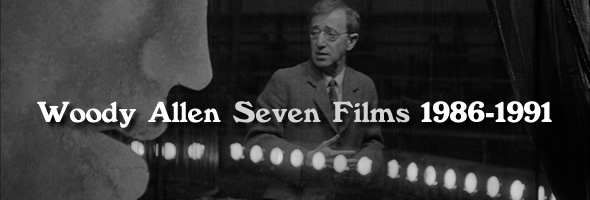
HANNAH AND HER SISTERS
Color, 1986,
Directed by Woody Allen
Starring Mia Farrow, Barbara Hershey, Dianne Wiest, Michael Caine, Woody Allen, Sam Waterston, Max Von Sydow, Carrie Fisher, Maureen O'Sullivan, Lloyd Nolan
Arrow Video (Blu-ray) (UK RB HD), MGM (Blu-ray & DVD) (US R0 HD, R1 NTSC) / WS (1.85:1) (16:9)
RADIO DAYS
Color, 1987, 88m.
Directed by Woody Allen
Starring Seth Green, Julie Kavner, Mia Farrow, Wallace Shawn, Michael Tucker, Dianne Wiest, Danny Aiello, Jeff Daniels
Arrow Video (Blu-ray) (UK RB HD), Twilight Time (Blu-ray) (US R0 HD), MGM (DVD) (US R1 NTSC) / WS (1.85:1) (16:9)
SEPTEMBER
Color, 1987,
Directed by Woody Allen
Starring Elaine Stritch, Denholm Elliott, Mia Farrow, Dianne Wiest, Sam Waterston, Jack Warden
Arrow Video (Blu-ray) (UK RB HD), MGM (DVD) (US R1 NTSC) / WS (1.85:1) (16:9)
ANOTHER WOMAN
Color, 1988, 81m.
Directed by Woody Allen
Starring Gena Rowlands, Mia Farrow, Ian Holm, Blythe Danner, Gene Hackman, Betty Buckley, Martha Plimpton, John Houseman, Sandy Dennis, David Ogden Stiers
Arrow Video (Blu-ray) (UK RB HD), MGM (DVD) (US R1 NTSC) / WS (1.85:1) (16:9)
CRIMES AND MISDEMEANORS
Color, 1989,
104m.
Directed by Woody Allen
Starring Martin Landau, Woody Allen, Claire Bloom, Jerry Orbach, Anjelica Huston, Joanna Gleason, Alan Alda, Sam Waterston
Arrow Video (Blu-ray) (UK RB HD), Twilight Time (Blu-ray) (US R0 HD), MGM (DVD) (US R1 NTSC) / WS (1.85:1) (16:9)
ALICE
Color, 1990, 106m.
Directed by Woody Allen
Starring Mia Farrow, William Hurt, Joe Mantegna, Keye Luke, June Squibb, Cybill Shepherd, Judy Davis, Alec Baldwin, Blythe Danner, Gwen Verdon, Patrick O'Neal, Bernadette Peters
Arrow Video (Blu-ray) (UK RB HD), MGM (DVD) (US R1 NTSC) / WS (1.85:1) (16:9)
SHADOWS AND FOG
B&W, 1991,
Directed by Woody Allen
Starring Woody Allen, Mia Farrow, John Malkovich, David Ogden Stiers, Madonna, Donald Pleasence, Lily Tomlin, Jodie Foster, Kathy Bates, John Cusack
Arrow Video (Blu-ray) (UK RB HD), Twilight Time (Blu-ray) (US R0 HD), MGM (DVD) (US R1 NTSC) / WS (1.85:1) (16:9)

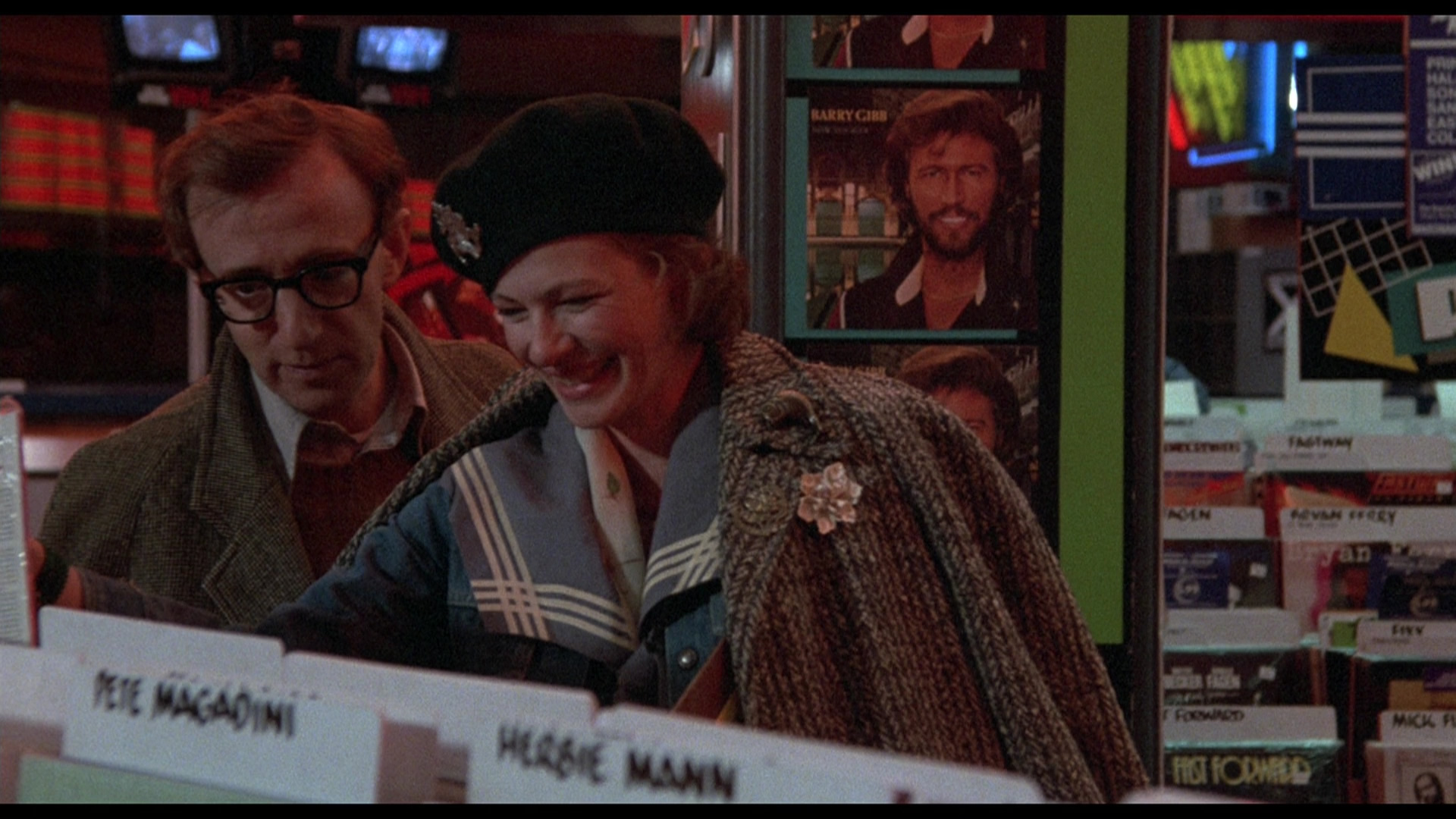 This third and presumably final set of Woody Allen films from Arrow Academy is a bit different from the preceding two boxes in that every single title comes from his fruitful period with Orion Pictures, and each one also stars his muse and real-life companion at the time, Mia Farrow. (They would split under much-publicized circumstances after one more film, the non-Orion Husbands and Wives.) Interestingly, while many of the films here contain funny elements, only one of them is a pure comedy; otherwise we find Allen in a more experimental mode working in elements of fantasy, horror, drama, and more than a few philosophical reveries. The box is also notable for containing entirely new disc authorings of each film compared to the past sets, which contained exact ports of the MGM Blu-rays of Annie Hall and Manhattan (right down to the menus).
This third and presumably final set of Woody Allen films from Arrow Academy is a bit different from the preceding two boxes in that every single title comes from his fruitful period with Orion Pictures, and each one also stars his muse and real-life companion at the time, Mia Farrow. (They would split under much-publicized circumstances after one more film, the non-Orion Husbands and Wives.) Interestingly, while many of the films here contain funny elements, only one of them is a pure comedy; otherwise we find Allen in a more experimental mode working in elements of fantasy, horror, drama, and more than a few philosophical reveries. The box is also notable for containing entirely new disc authorings of each film compared to the past sets, which contained exact ports of the MGM Blu-rays of Annie Hall and Manhattan (right down to the menus).
First up is one of Allen's undisputed career high points, Hannah and Her Sisters, which racked up a trio of Oscars and still stands as one of his most satisfying fusions of comedy and drama. Farrow stars as Hannah, a woman whose husband, Elliot (Caine), has become smitten with her sister, Lee (Hershey), who's in turn involved with a much older writer, Frederick (Von Sydow). 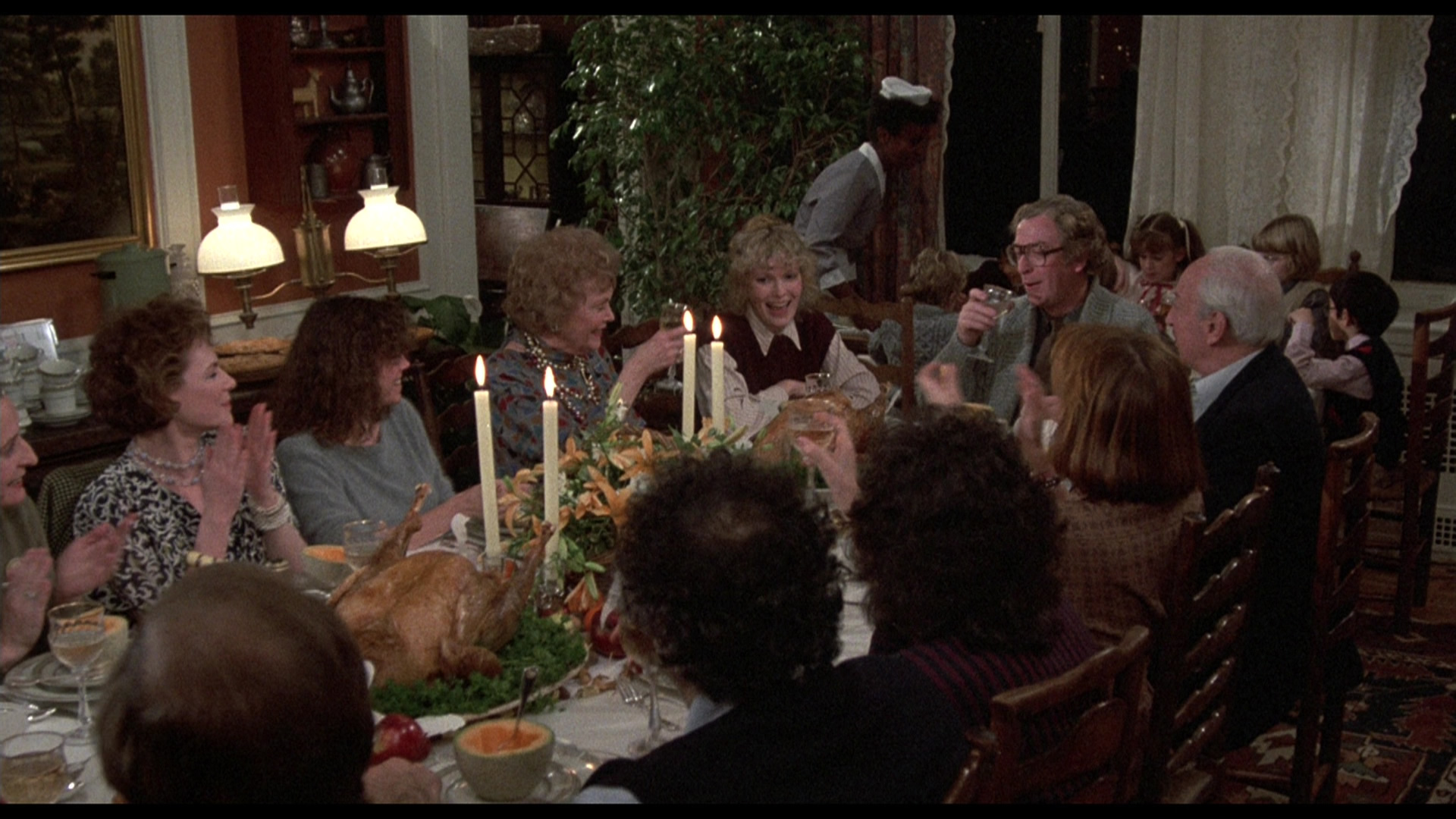 Meanwhile Hannah's ex, hypochondriac TV producer Mickey (Allen), tries to find meaning in his life, while third sister Holly (Wiest) has rotten relationship luck and had once gone on a disastrous date with Mickey during her punk rock phase. Over the course of a pair of family Thanksgivings, everyone will come out a bit changed and a lot more enlightened.
Meanwhile Hannah's ex, hypochondriac TV producer Mickey (Allen), tries to find meaning in his life, while third sister Holly (Wiest) has rotten relationship luck and had once gone on a disastrous date with Mickey during her punk rock phase. Over the course of a pair of family Thanksgivings, everyone will come out a bit changed and a lot more enlightened. 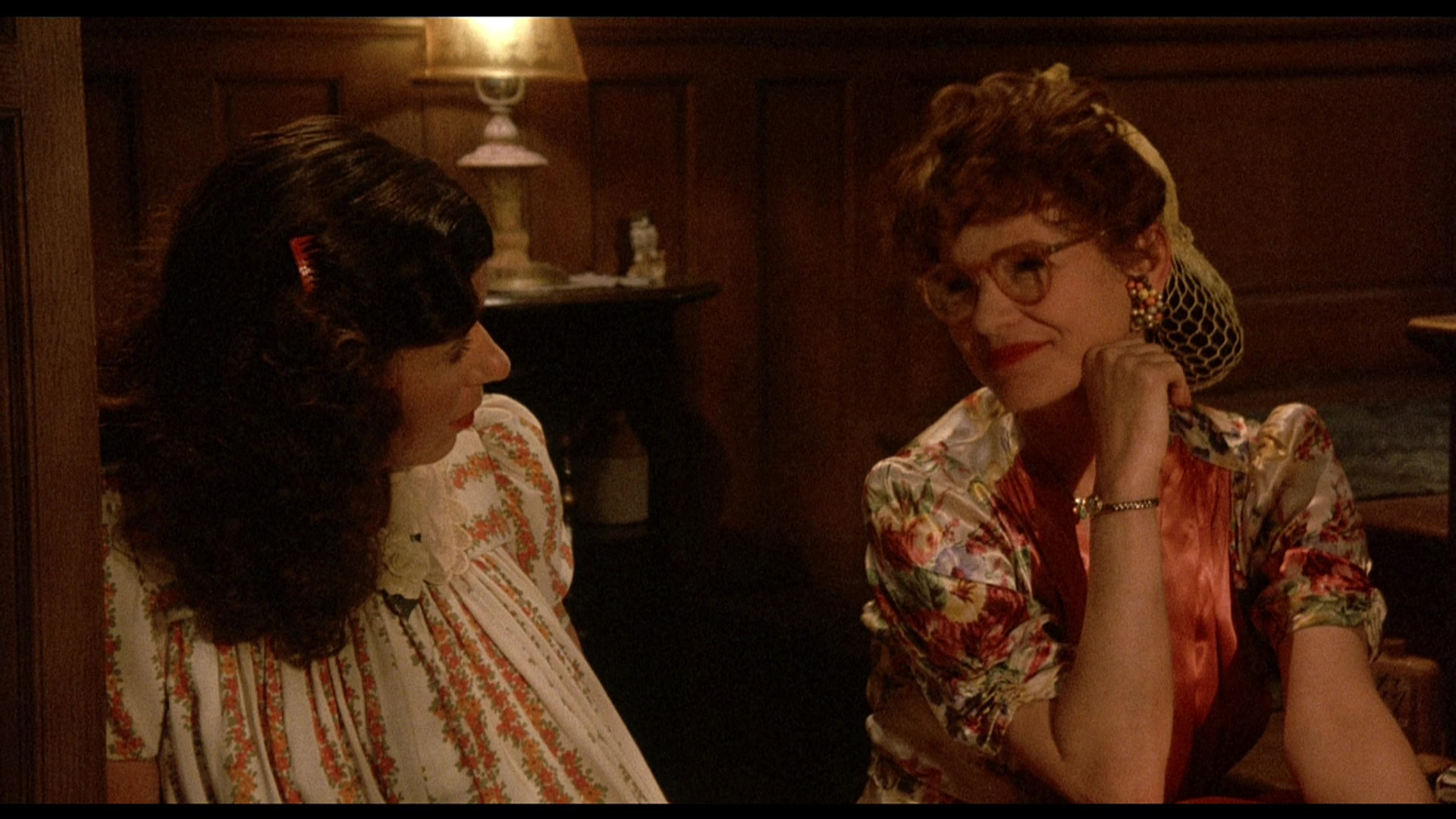
Featuring one of Allen's strongest ensembles, this film justifiably ranks in the top tier of his films (not to mention quite a feat considering it was made just after the classic The Purple Rose of Cairo) with a skillful juggling of multiple storylines that converge quite satisfyingly in the closing moments. In her fifth Allen film, Farrow is mostly relegated to a secondary character here despite the title; instead the juiciest moments go to Wiest and Caine, both of whom waltzed home with Oscars for their work. The film has been steadily available on home video in many incarnations over the years from Orion and MGM VHS editions to an MGM DVD both as a standalone and part of a big Allen boxed set in 2001. The subsequent MGM Blu-ray features only a trailer as an extra (par for the course for Allen, who refuses to allow substantial bonus features on his titles), and it's a pleasing presentation that actually looks stronger than the Orion prints did back in the day. It really offers a fine showcase for the cinematography by Carlo Di Palma, here in his inaugural Allen film (after a couple of Michelangelo Antonioni titles) and something of a visual lucky charm for the filmmaker well into the 1990s. The Arrow release is taken from the same source but looks subtly improved here thanks to a more generous and careful compression job; compare this frame grab from the MGM Blu-ray with the one on the left, and you can see how both textures  and film grain (especially in white areas) are better resolved. As with the other titles after this, the LPCM English mono audio sounds perfect, with optional English SDH subtitles; the theatrical trailer is the one bonus feature on the disc.
and film grain (especially in white areas) are better resolved. As with the other titles after this, the LPCM English mono audio sounds perfect, with optional English SDH subtitles; the theatrical trailer is the one bonus feature on the disc.
If Purple Rose had a sad-eyed nostalgia about the golden age of movie palaces as escapism, Radio Days takes a far sunnier look back at a medium that defined American popular culture for half of the 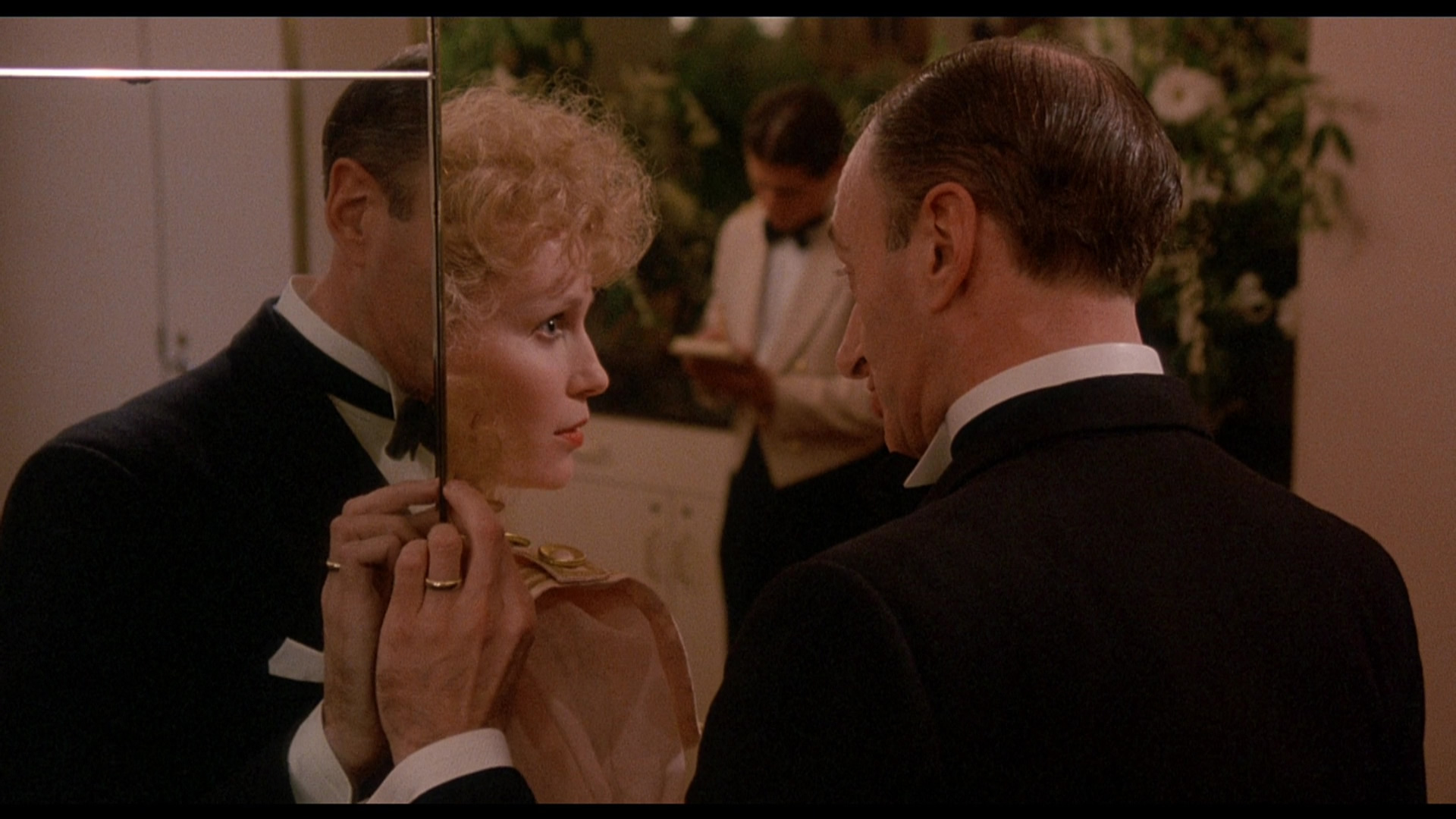 twentieth century. Allen narrates but doesn't appear on screen for a depiction of a (semi-autobiographical) family growing up in Brooklyn with radio a constant presence in the life of young Joe (Green), who's enraptured by conflicting gossip stories about the various radio personalities including the unlikely and much-debated rise to prominence of Sally White (Farrow). Meanwhile Joe's domestic situation is highlighted by the romantic foibles of his Aunt Bea (Wiest), whose destiny follows a path as implausible as any wireless program. One of Allen's warmest films, this is also a cavalcade of surprising faces including what was at the time a startling and beautiful cameo appearance by Allen's most famous '70s muse, Diane Keaton (who would join him again the following decade for the excellent Manhattan Murder Mystery). However, you can also spy a young Larry David (who would go on to play an Allen surrogate in Whatever Works many years later), Tito Puente, Kenneth Mars, future director Todd Field, Mercedes Ruehl, and even a quick bit by Allen's frequent '70s cohort, Tony Roberts.
twentieth century. Allen narrates but doesn't appear on screen for a depiction of a (semi-autobiographical) family growing up in Brooklyn with radio a constant presence in the life of young Joe (Green), who's enraptured by conflicting gossip stories about the various radio personalities including the unlikely and much-debated rise to prominence of Sally White (Farrow). Meanwhile Joe's domestic situation is highlighted by the romantic foibles of his Aunt Bea (Wiest), whose destiny follows a path as implausible as any wireless program. One of Allen's warmest films, this is also a cavalcade of surprising faces including what was at the time a startling and beautiful cameo appearance by Allen's most famous '70s muse, Diane Keaton (who would join him again the following decade for the excellent Manhattan Murder Mystery). However, you can also spy a young Larry David (who would go on to play an Allen surrogate in Whatever Works many years later), Tito Puente, Kenneth Mars, future director Todd Field, Mercedes Ruehl, and even a quick bit by Allen's frequent '70s cohort, Tony Roberts.
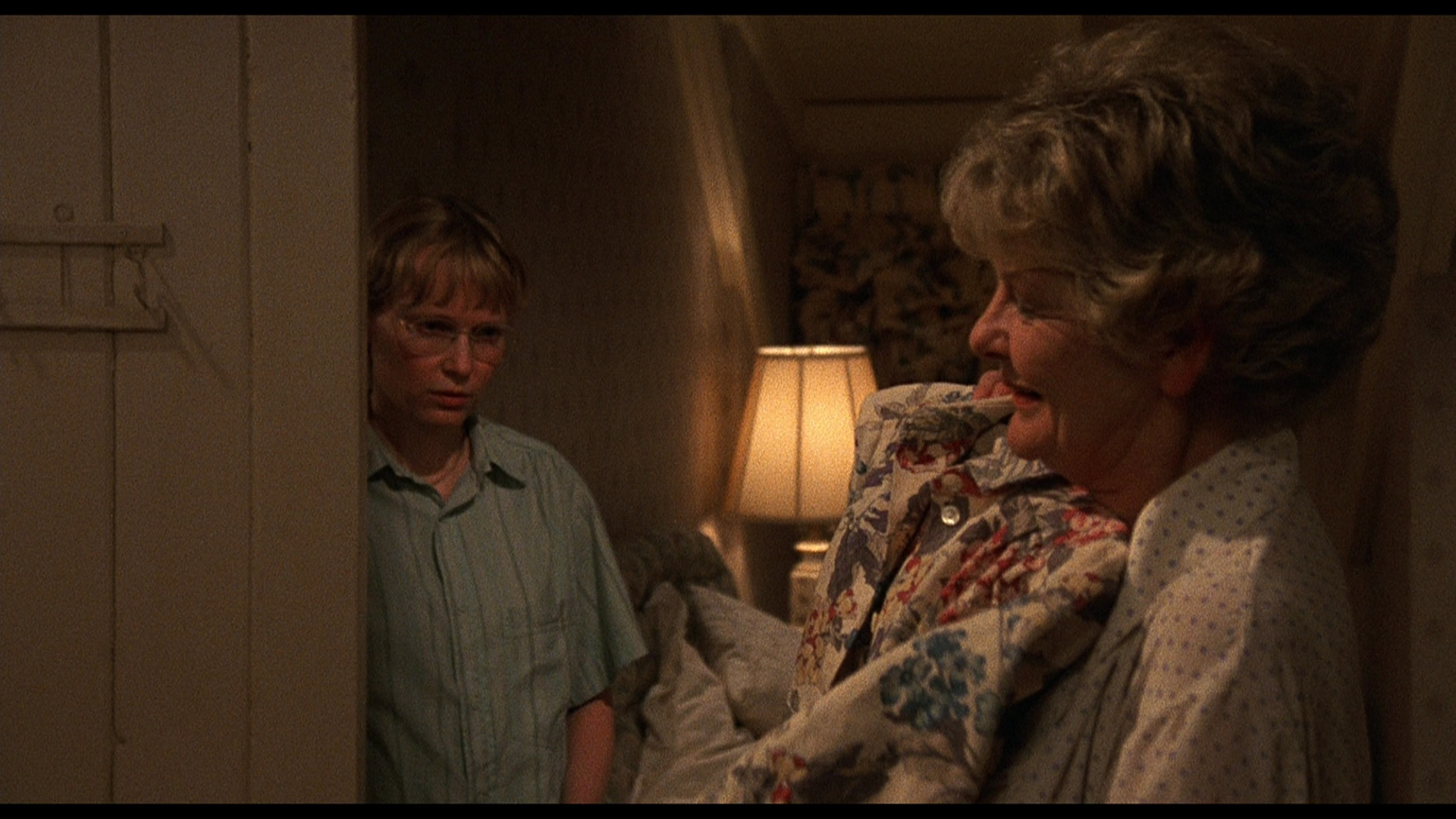 Radio Days was first released on Blu-ray from Twilight Time in 2014, sporting a terrific transfer, a DTS-HD MA English mono track (with optional English subtitles, an isolated music track, and the theatrical trailer. That's pretty much what you get with the Arrow disc as well except it's an LPCM track (more spacious file size, pretty much identical quality) and no isolated track (which
Radio Days was first released on Blu-ray from Twilight Time in 2014, sporting a terrific transfer, a DTS-HD MA English mono track (with optional English subtitles, an isolated music track, and the theatrical trailer. That's pretty much what you get with the Arrow disc as well except it's an LPCM track (more spacious file size, pretty much identical quality) and no isolated track (which 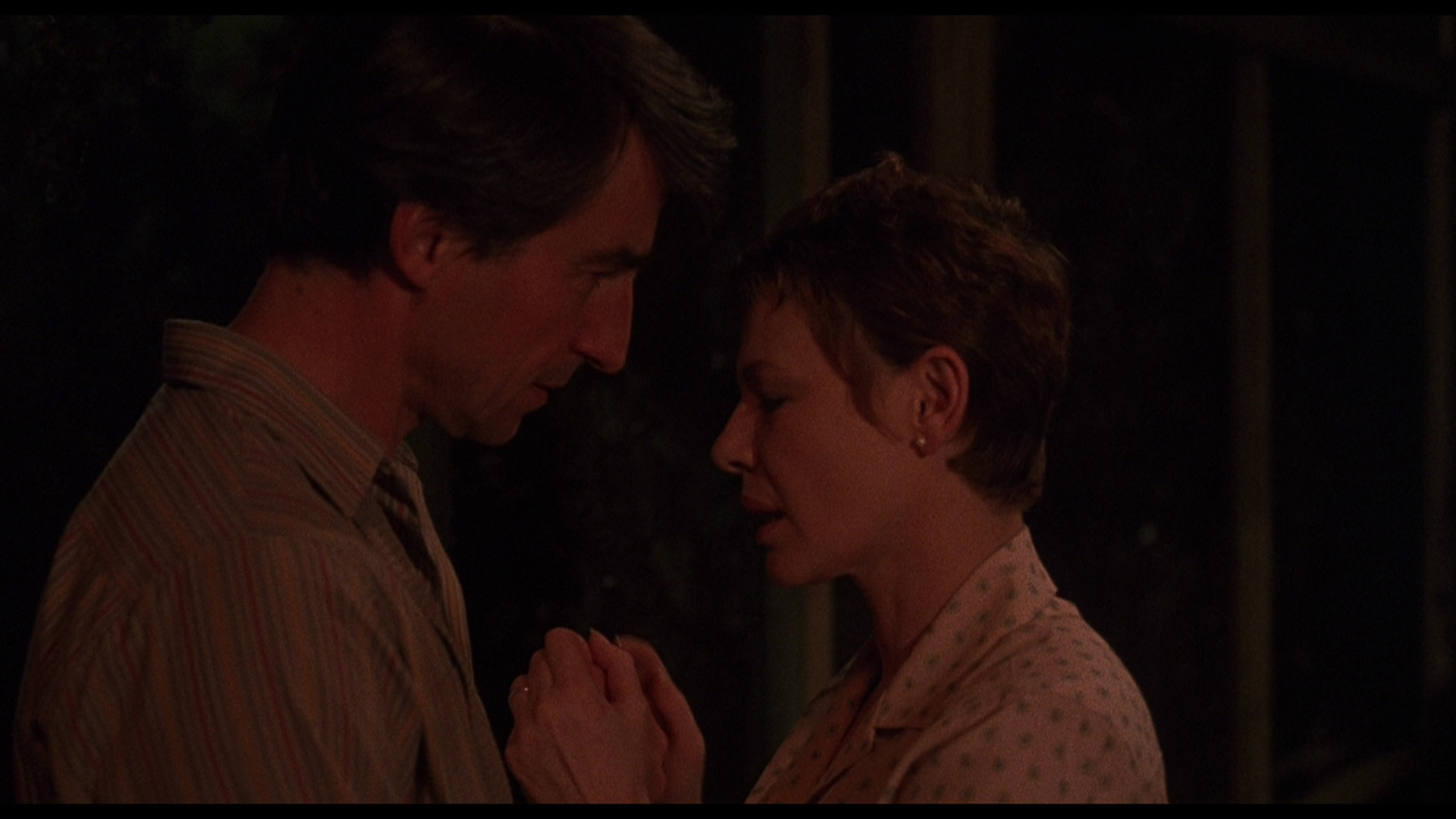 is all vintage music anyway).
is all vintage music anyway).
Allen had really split critics with his haunting but very unexpected 1978 drama Interiors, basically a love letter to the more somber films by idol Ingmar Bergman (with a heavy dash of Chekhov), and he decided to mine similar territory almost a decade later in 1987 with September. This time Farrow goes full-on dramatic as Lane, the owner of a country house where various acquaintances converge for a weekend getaway. The most dominating personality is movie actress Diane (Broadway legend Stritch), Lane's mother, who's married to Lloyd (Warden) and has a deep-seated unspoken rift with her daughter, who's recovering from a nervous breakdown and currently in a relationship with Howard (Elliott)-- and nursing a crush on Peter (Waterston). Into the mix comes Lane's best friend, Stephanie (Wiest), who throws another romantic wrench into the works.
One of the more infamous 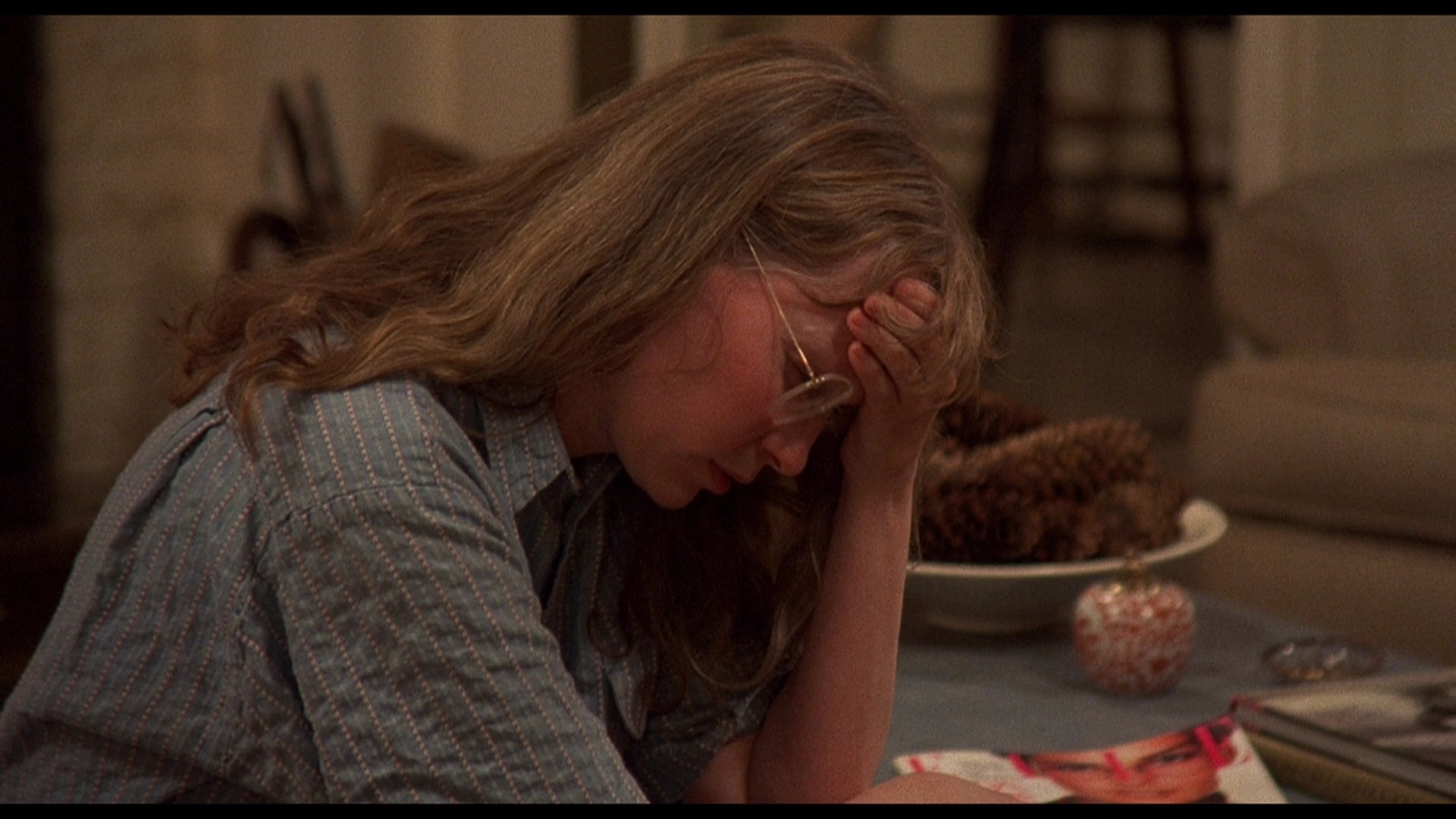 films in the Allen canon, September was first shot with an almost entirely different cast but ultimately scrapped and retooled when Allen felt it just wasn't working. (Among the original actors were Maureen O'Sullivan, Sam Shepherd, and Charles Durning, with Farrow and Wiest appearing in both versions.) What we have now (the first run-through was apparently destroyed) is a bumpy but fascinating stab at a dramatic art film with a solid
films in the Allen canon, September was first shot with an almost entirely different cast but ultimately scrapped and retooled when Allen felt it just wasn't working. (Among the original actors were Maureen O'Sullivan, Sam Shepherd, and Charles Durning, with Farrow and Wiest appearing in both versions.) What we have now (the first run-through was apparently destroyed) is a bumpy but fascinating stab at a dramatic art film with a solid 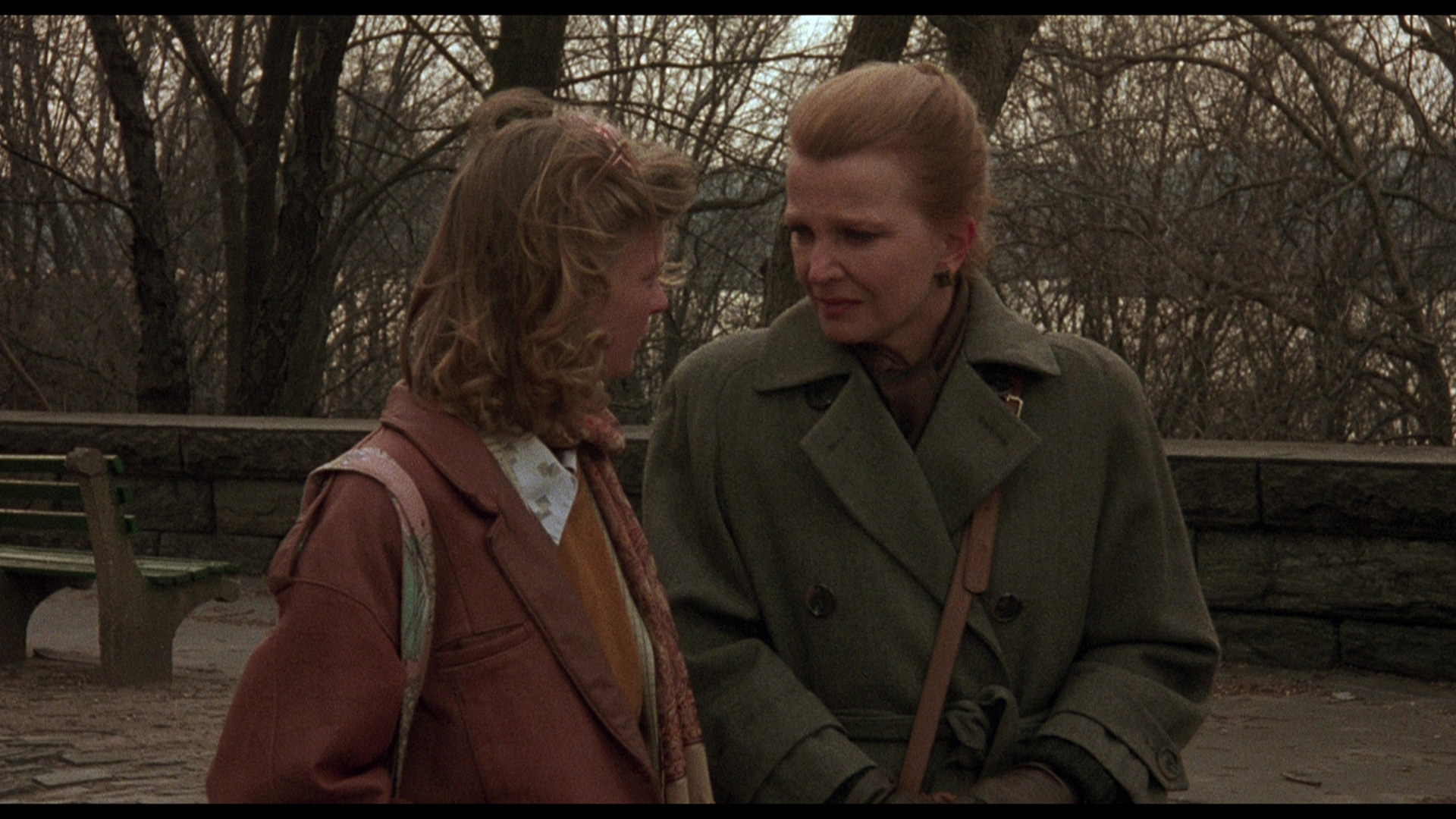 group of performances given lots of meaty monologues to work with; Waterston (who was also in Interiors) is the only one who feels a bit miscast as the youngest male love interest, who isn't exactly exuding sexual charisma here. It still feels more like a draft than a fully formed film (Allen has gone on record a few times saying he'd love to film it a third time), which also makes it useful to grapple with some of the more challenging films to come in the Allen canon. Again cinematographer Carlo Di Palma earns his stripes here with some breathtaking work that turns the summer house setting into an expressionistic extension of the characters and a perfect encapsulation of the titular season. Arrow's release marks the film's HD debut, and it's a real beauty with an earthy color palette and a far more subtle, tactile feeling than its previous DVD releases could have ever conveyed.
group of performances given lots of meaty monologues to work with; Waterston (who was also in Interiors) is the only one who feels a bit miscast as the youngest male love interest, who isn't exactly exuding sexual charisma here. It still feels more like a draft than a fully formed film (Allen has gone on record a few times saying he'd love to film it a third time), which also makes it useful to grapple with some of the more challenging films to come in the Allen canon. Again cinematographer Carlo Di Palma earns his stripes here with some breathtaking work that turns the summer house setting into an expressionistic extension of the characters and a perfect encapsulation of the titular season. Arrow's release marks the film's HD debut, and it's a real beauty with an earthy color palette and a far more subtle, tactile feeling than its previous DVD releases could have ever conveyed.
Apparently still bitten by the drama bug, Allen had more success the following year with Another Woman, a more finely-honed and confident production with a precise screenplay that offers a great showcase for star Gena Rowlands. 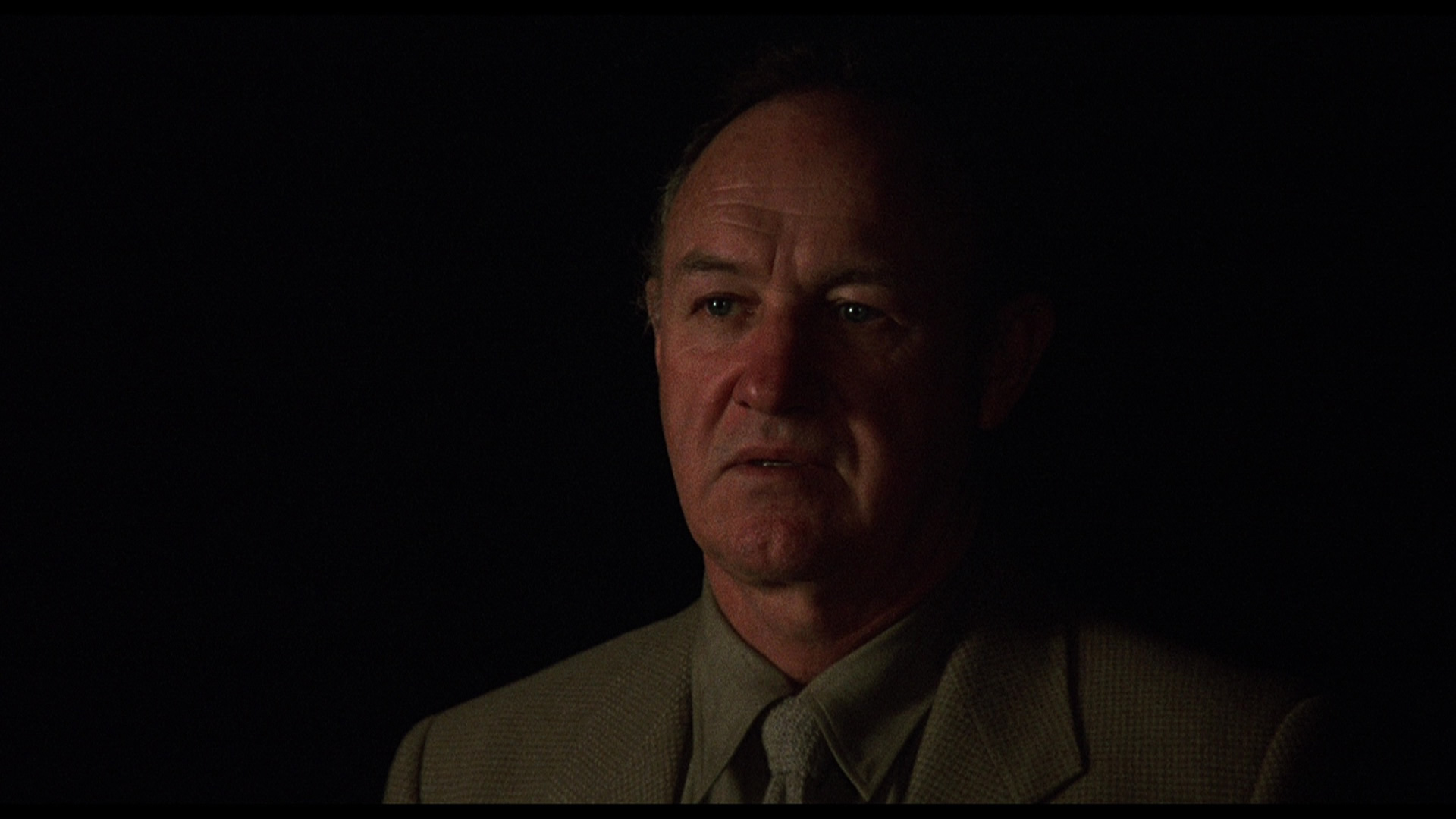 Here the indie film giant plays Marion, a writer and college dean who's recently decided to get past the death of her first husband by marrying Ken (Holm) and taking time off to embark on a new book. In the process of working next to a psychiatrist's office she overhears patient Hope (Farrow), whose confessions trigger an existential crises and lengthy bout of self-examination by Marion that also envelops her stepdaughter (Plimpton), potential past flame Larry (Hackman), and everyone else around her.
Here the indie film giant plays Marion, a writer and college dean who's recently decided to get past the death of her first husband by marrying Ken (Holm) and taking time off to embark on a new book. In the process of working next to a psychiatrist's office she overhears patient Hope (Farrow), whose confessions trigger an existential crises and lengthy bout of self-examination by Marion that also envelops her stepdaughter (Plimpton), potential past flame Larry (Hackman), and everyone else around her. 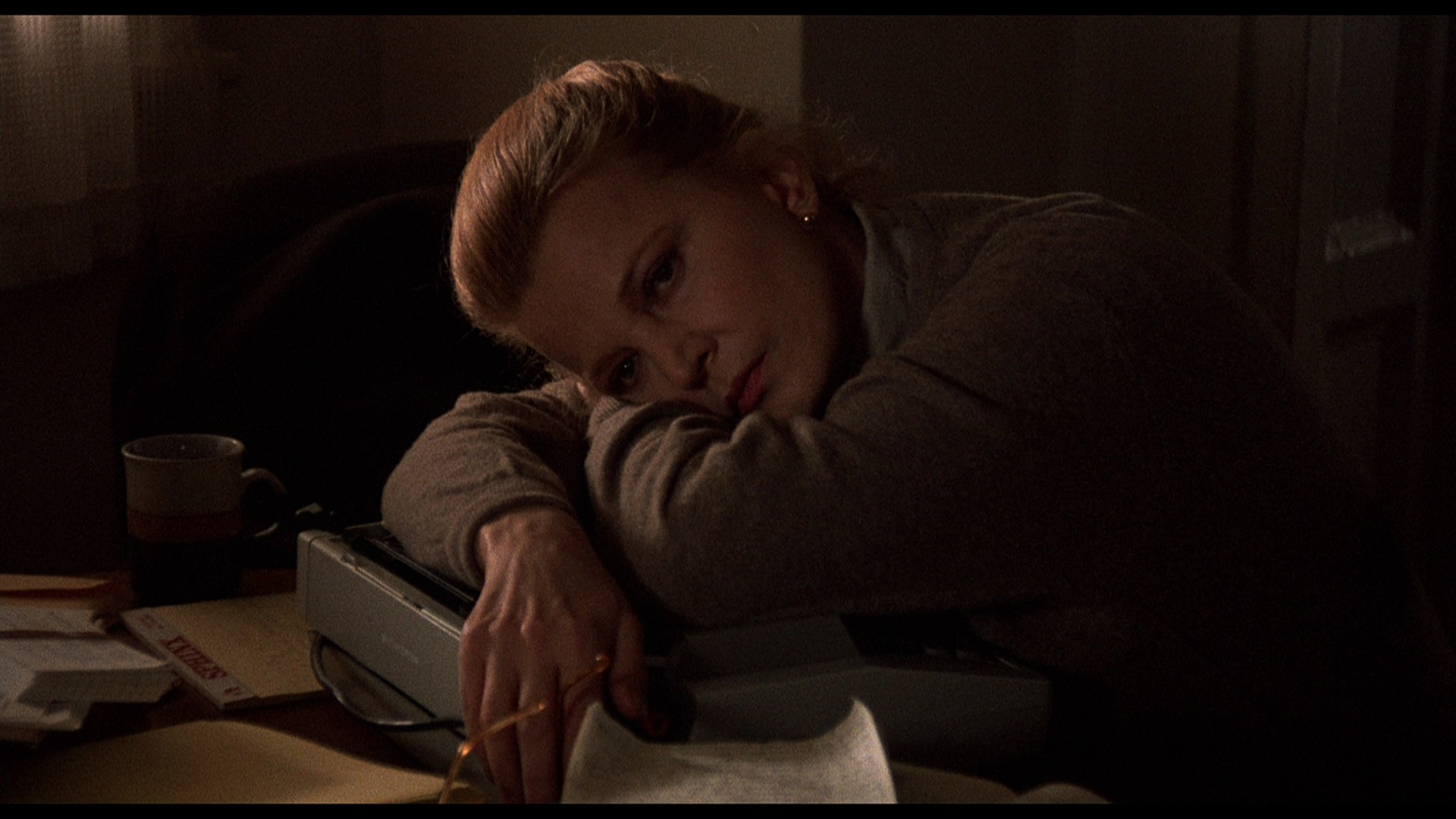
Short, compact, and highly effective, this film shows Allen grappling more successfully with his dramatic direction of actors and juggling a pretty astounding cast with more than a fair share of stage and screen veterans including Betty Buckley and Sandy Dennis in solid supporting roles and a poignant bit by John Houseman in one of his final roles as Rowlands' father. Again this one makes its worldwide Blu-ray debut in the Arrow box and looks great, particularly rendering the many dark scenes with a nice sense of inky depth that was absent on the prior DVD and a fine replication of the Bergman-esque sculpting with light in most of the interior scenes.
After having a bit of a palette cleanser with a segment of the best installment of the comic anthology film New York Stories, Allen closed out the '80s on a high note with one of his most important and acclaimed films, Crimes and Misdemeanors, perhaps his quintessential look at comedy versus 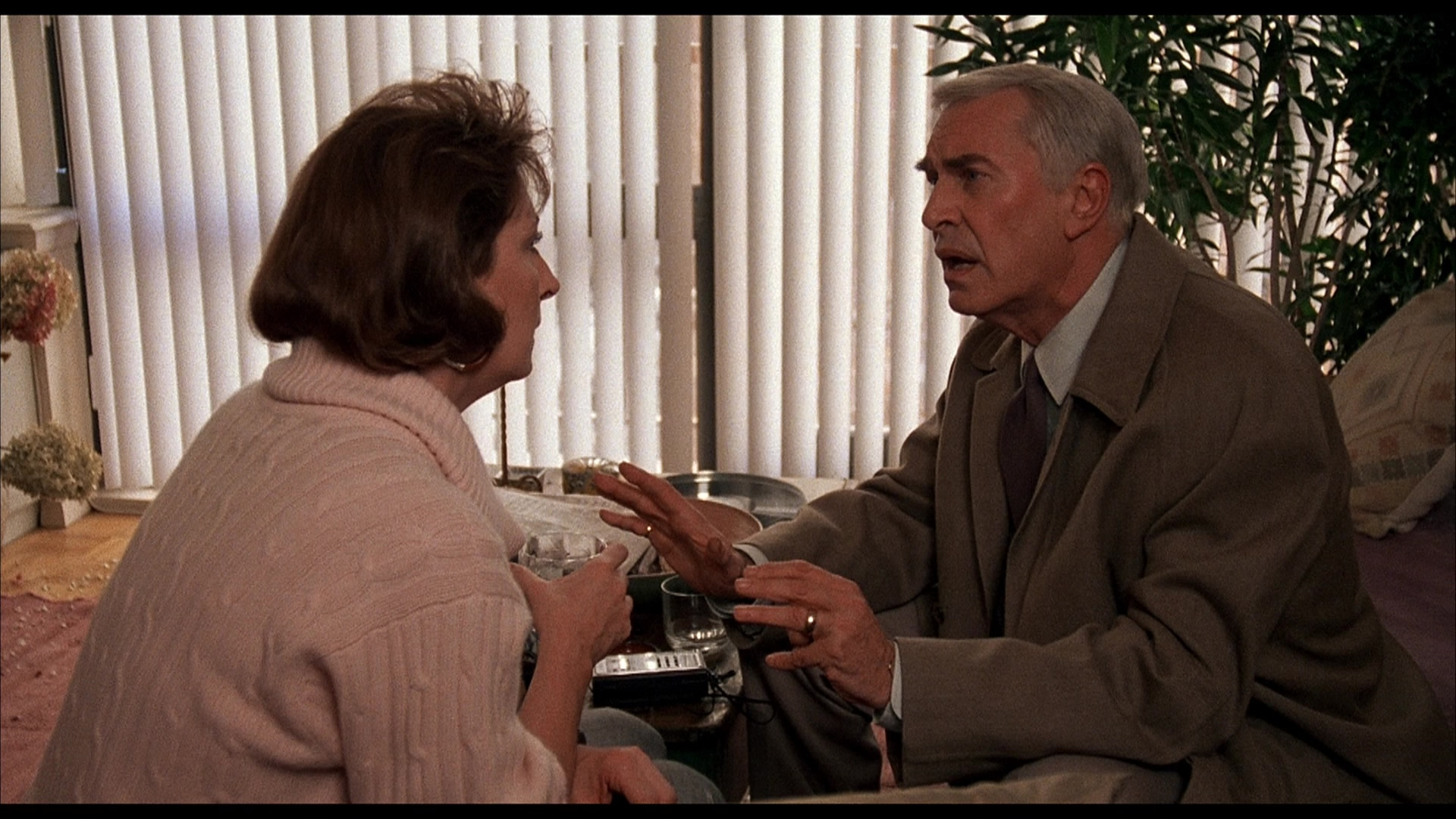 drama as well as the baffling nature of how morality plays out in a civilized society. The film is essentially structured as two stories that don't converge until the very end, with Martin Landau getting one of his best roles as wayward eye doctor Judah Rosenthal. He's been carrying on a lengthy affair with stewardess Dolores (Huston) and finds himself painted into a corner when she threatens to expose him, leading to the question of how he can silence her for
drama as well as the baffling nature of how morality plays out in a civilized society. The film is essentially structured as two stories that don't converge until the very end, with Martin Landau getting one of his best roles as wayward eye doctor Judah Rosenthal. He's been carrying on a lengthy affair with stewardess Dolores (Huston) and finds himself painted into a corner when she threatens to expose him, leading to the question of how he can silence her for 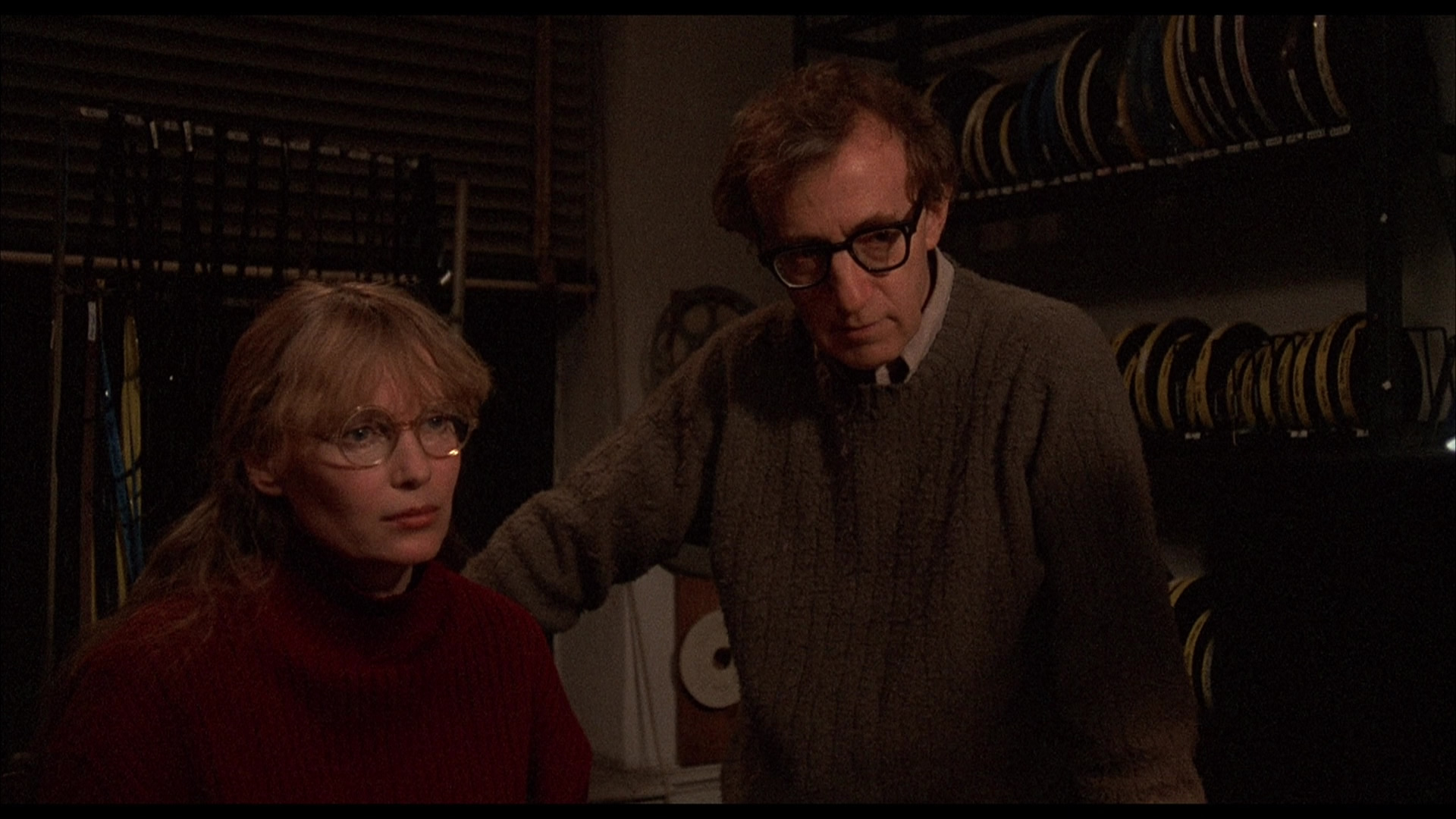 good and still live with himself. Meanwhile documentarian Cliff Stern (Allen) decides to sell out his dream project when he's offered the commercial prospect of profiling his arrogant brother-in-law, Lester (Alda), and both men end up going after pretty production assistant Halley (Farrow). If you think you know where both stories are heading, you're most likely wrong.
good and still live with himself. Meanwhile documentarian Cliff Stern (Allen) decides to sell out his dream project when he's offered the commercial prospect of profiling his arrogant brother-in-law, Lester (Alda), and both men end up going after pretty production assistant Halley (Farrow). If you think you know where both stories are heading, you're most likely wrong.
The approach here feels very much like the material the Coen Brothers would mine in later years (this would make a great double feature with A Serious Man), and in fact it's been reverberated on and off throughout the rest of Allen's career as well in ways both blatant (the London-set near remake Match Point) and subtle (the Corey Stoll subplot in Cafe Society). The humor here is much more disturbing as the storylines go into some very dark territory, creating a kind of existential angst at times without ever becoming heavy or depressing. Interestingly, it doesn't seem beholden to any specific 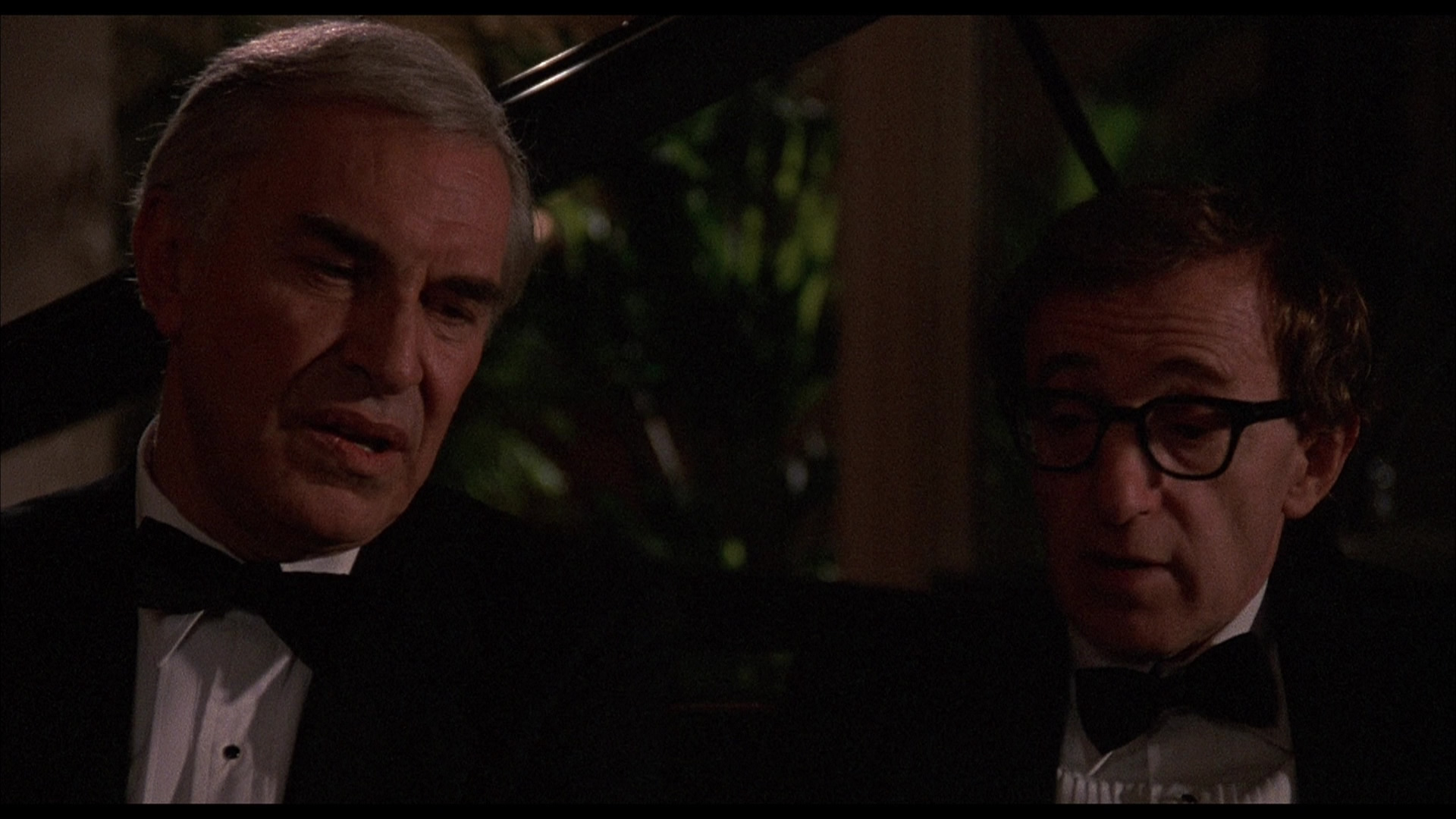 cinematic or literary influences (despite the Dostoyevsky-style title); the film is a true original across the board and a fine encapsulation of Allen styles and themes all in one unforgettable package.
cinematic or literary influences (despite the Dostoyevsky-style title); the film is a true original across the board and a fine encapsulation of Allen styles and themes all in one unforgettable package.
As with Radio Days, Crimes and Misdemeanors first appeared on Blu-ray from Twilight Time (following the usual routes on VHS and DVD) with a sterling transfer, an isolated music track (all source music), and the theatrical  trailer. The Arrow release looks almost identical since it sports a similarly high bit rate and comes from the same immaculate source, which should be the best this looks on home video for a very long time.
trailer. The Arrow release looks almost identical since it sports a similarly high bit rate and comes from the same immaculate source, which should be the best this looks on home video for a very long time.
Perhaps the most underrated film in this set, 1990's Alice marks one of Allen's rare forays into magic realism, something he had explored in A Midsummer Night's Sex Comedy and would touch on again most famously with Midnight in Paris. It's also his most satisfying showcase for Farrow, who occupies every scene and has rarely been more charming or allowed to show her range so effectively on screen. Here she plays Alice, a married Catholic Manhattan mother of two with a somewhat neglectful husband of sixteen years, Doug (Hurt), a case of recurring back pain, and a recent crush on Joe (Mantegna), a single dad at her childrens' school. Three times in one day she's recommended to go see a Chinese herbalist and acupuncturist called Dr. Yang (Luke in his final film role), who turns out to change her life when he opens 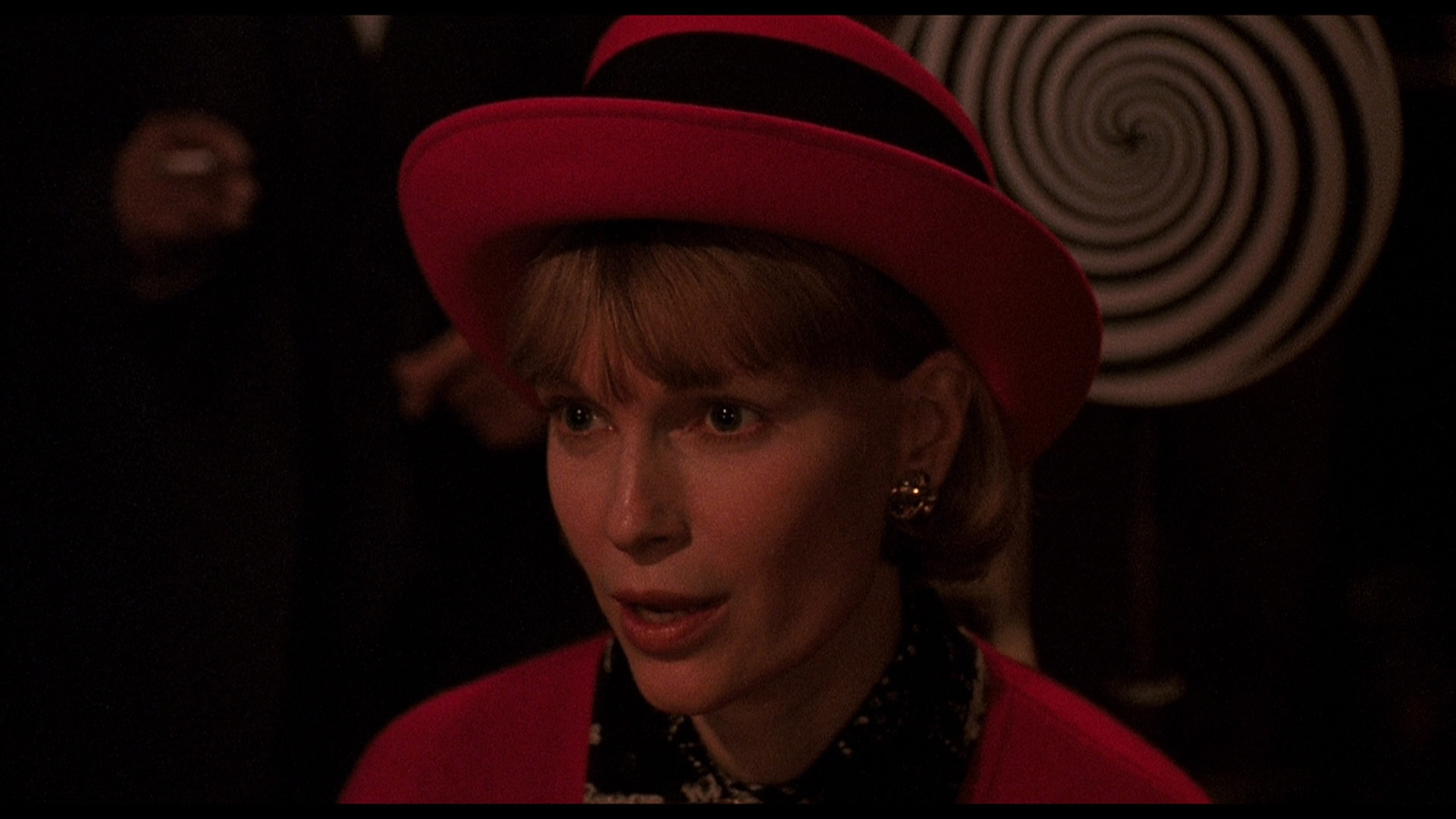 her up to hypnotism and the use of herbs. In the process she finds herself pursuing Joe, discovering the joys of invisibility and flight, and discovering her true purpose through visits from her late first husband (Baldwin) and her creative muse (Peters).
her up to hypnotism and the use of herbs. In the process she finds herself pursuing Joe, discovering the joys of invisibility and flight, and discovering her true purpose through visits from her late first husband (Baldwin) and her creative muse (Peters).
Though Allen is primarily known for referencing the work of Ingmar Bergman, he's also quite the Federico Fellini fan (just see Stardust Memories) and here crafts a beguiling modern twist on Juliet of the Spirits. 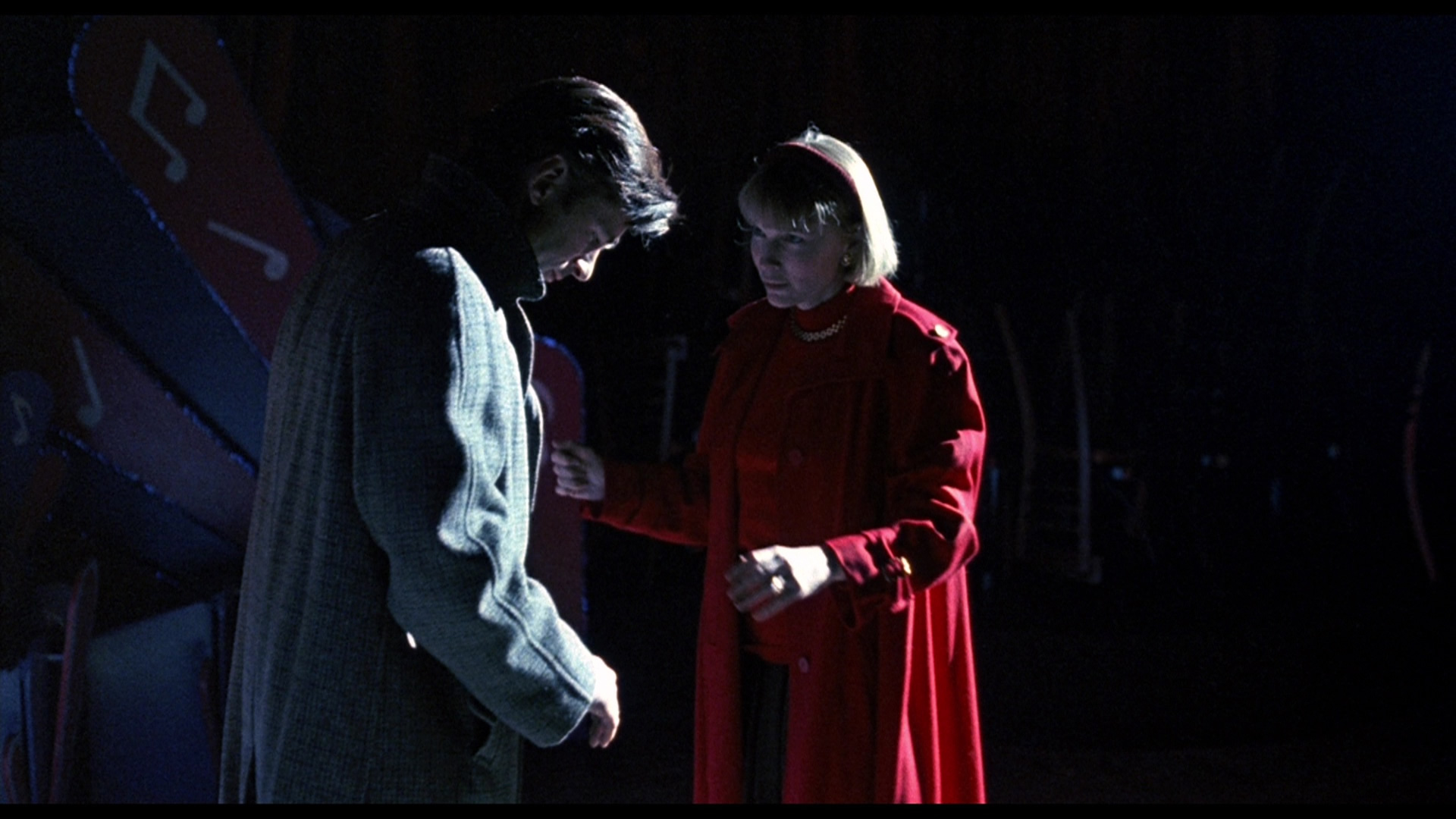 Farrow's about as close to an American version of Giuletta Masini as we'll get (her first verbal encounter with Mantegna is one of her finest hours), and she's up to the challenge here creating a complex and sympathetic character dealing with Catholic guilt and the pain of adultery on the way to a surprising but very satisfying finale that's quite removed from what most viewers are probably expecting. The Fellini touches are subtle but effective here with the obligatory fantasy sequences and even a trip to the circus, while the colorful cast of supporting characters (mostly glorified cameos) works in a wide array of surprising faces including Julie Kavner, Bob Balaban, Judy Davis, and plenty more. At 106 minutes the film is a bit longer than it needed to be (a late and silly digression involving love herbs misappropriated at a dinner party could have easily been dropped), but overall it's a fine way for Allen to start the '90s and a real jewel from his Orion period.
Farrow's about as close to an American version of Giuletta Masini as we'll get (her first verbal encounter with Mantegna is one of her finest hours), and she's up to the challenge here creating a complex and sympathetic character dealing with Catholic guilt and the pain of adultery on the way to a surprising but very satisfying finale that's quite removed from what most viewers are probably expecting. The Fellini touches are subtle but effective here with the obligatory fantasy sequences and even a trip to the circus, while the colorful cast of supporting characters (mostly glorified cameos) works in a wide array of surprising faces including Julie Kavner, Bob Balaban, Judy Davis, and plenty more. At 106 minutes the film is a bit longer than it needed to be (a late and silly digression involving love herbs misappropriated at a dinner party could have easily been dropped), but overall it's a fine way for Allen to start the '90s and a real jewel from his Orion period. 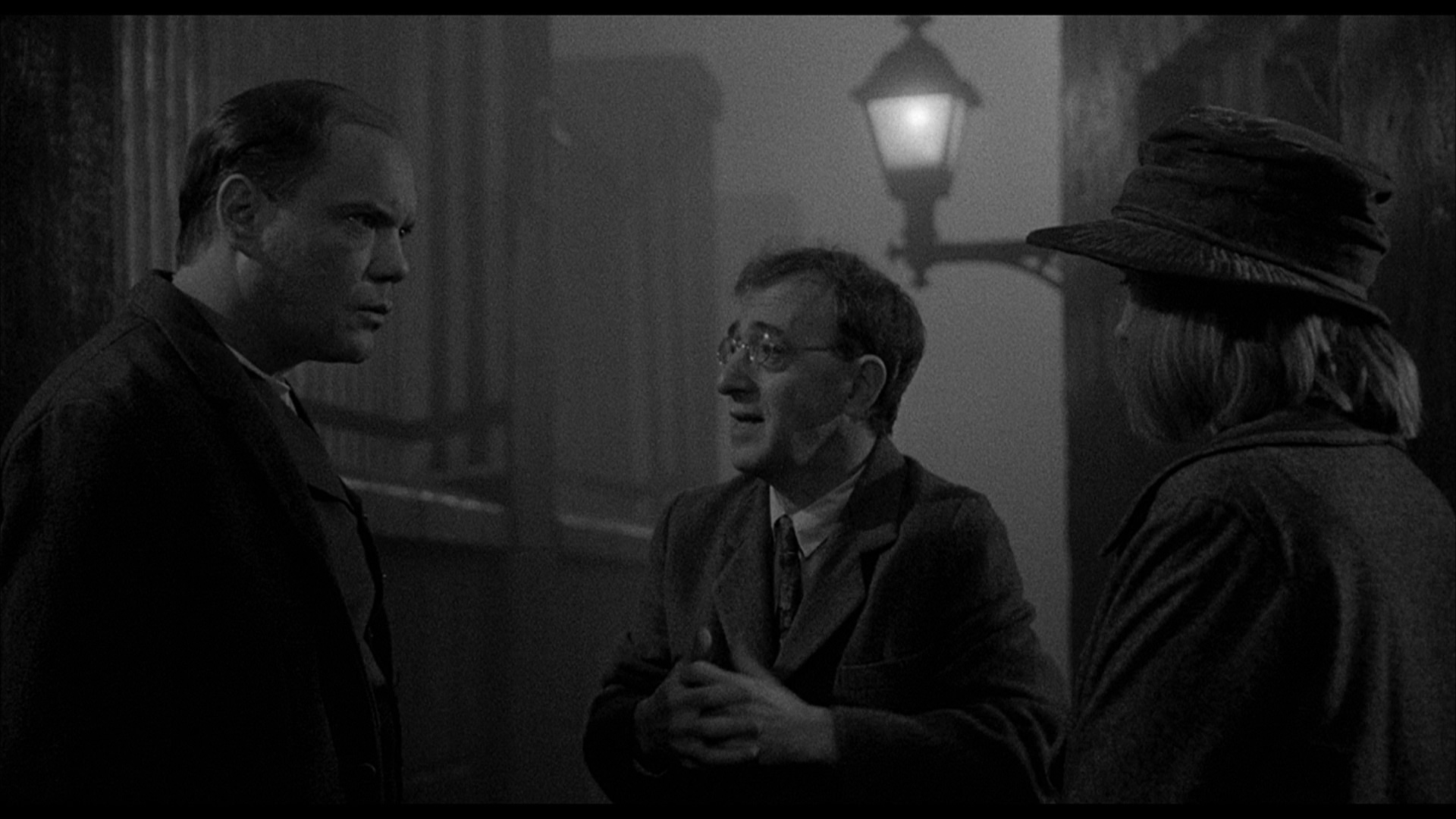 Carlo Di Palma's cinematography here is among his best work, creating fascinating layers of textures in the background of every shot and creating a convincing urban world where magic is lurking just under the surface. Alice has been long available on DVD from MGM in the United States and other territories, but the Arrow release marks its HD debut with a beautiful transfer that does a far finer job of handling the rich, dark look of the film than standard def could ever hope to accomplish.
Carlo Di Palma's cinematography here is among his best work, creating fascinating layers of textures in the background of every shot and creating a convincing urban world where magic is lurking just under the surface. Alice has been long available on DVD from MGM in the United States and other territories, but the Arrow release marks its HD debut with a beautiful transfer that does a far finer job of handling the rich, dark look of the film than standard def could ever hope to accomplish.
The closest thing to an outright horror film in the Allen filmography is the last film in this set, Shadows and Fog, an ambitious and visually stunning ode to German Expressionism that confounded many viewers and critics at the time but 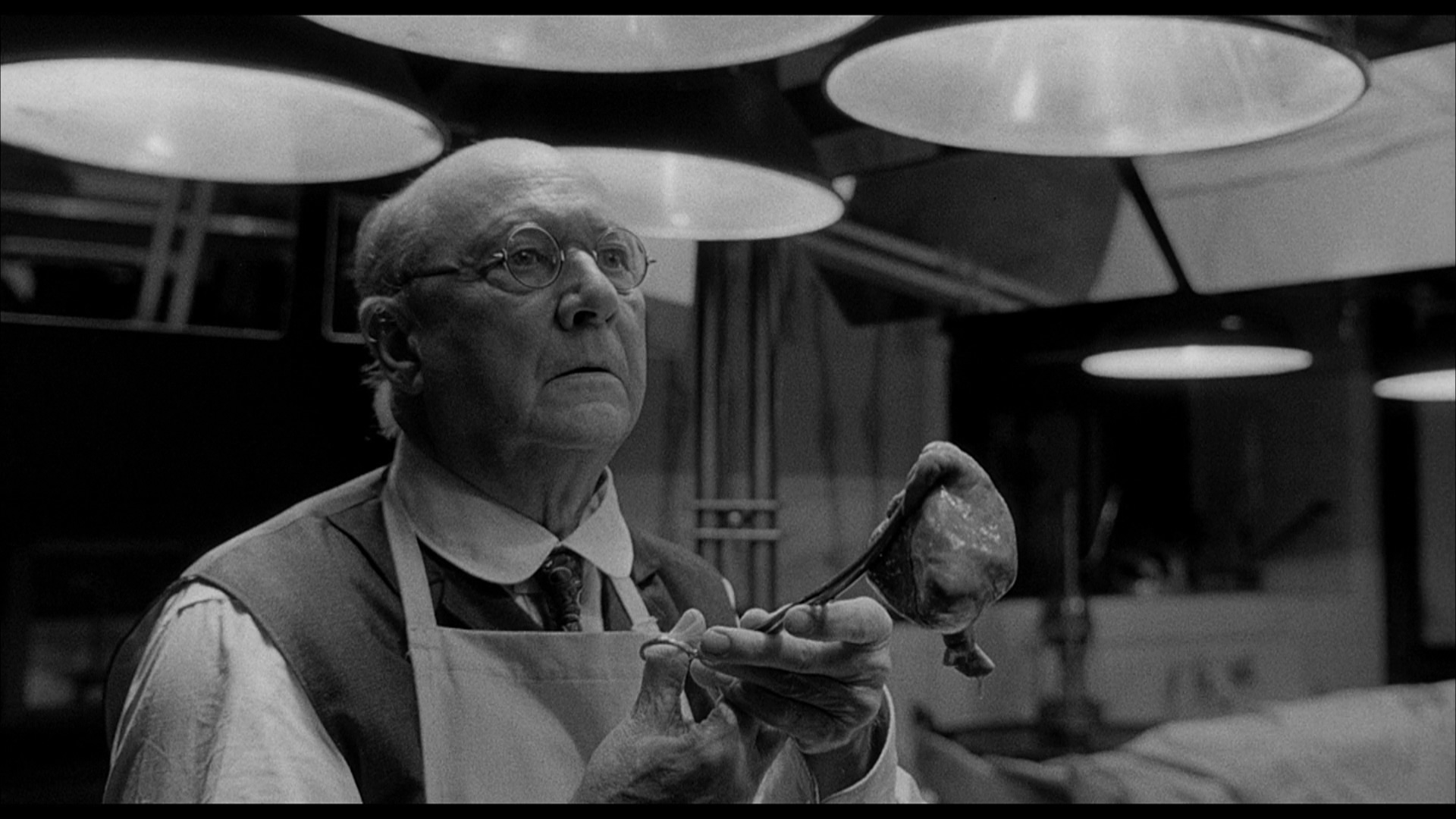 continues to improve with age. For this adaptation of Allen's one-act play Death (published in his 1972 book Without Feathers), Allen commissioned the construction of a record-breaking vast set in New York as a cinematic playground for a recreation of the worlds of filmmakers like Fritz Lang, F.W. Murnau, and G.W. Pabst. A serial killer is on the loose in a European village, striking at night and strangling seemingly random residents to death under the cover of nocturnal fog. Nervous bookkeeper Kleinman (Allen) is roused from bed by his neighbors to track down the maniac, but he stalls joining the lynch mob until they have moved on. Instead Kleinman crosses paths with a traveling circus including a clown (Malkovich), his lover Irmy (Farrow), and seductive tightrope walker Marie (Madonna). A betrayed Irmy decides to leave the circus and ends up joining Kleinman for the night, which turns into a swirling, comic nightmare.
continues to improve with age. For this adaptation of Allen's one-act play Death (published in his 1972 book Without Feathers), Allen commissioned the construction of a record-breaking vast set in New York as a cinematic playground for a recreation of the worlds of filmmakers like Fritz Lang, F.W. Murnau, and G.W. Pabst. A serial killer is on the loose in a European village, striking at night and strangling seemingly random residents to death under the cover of nocturnal fog. Nervous bookkeeper Kleinman (Allen) is roused from bed by his neighbors to track down the maniac, but he stalls joining the lynch mob until they have moved on. Instead Kleinman crosses paths with a traveling circus including a clown (Malkovich), his lover Irmy (Farrow), and seductive tightrope walker Marie (Madonna). A betrayed Irmy decides to leave the circus and ends up joining Kleinman for the night, which turns into a swirling, comic nightmare. 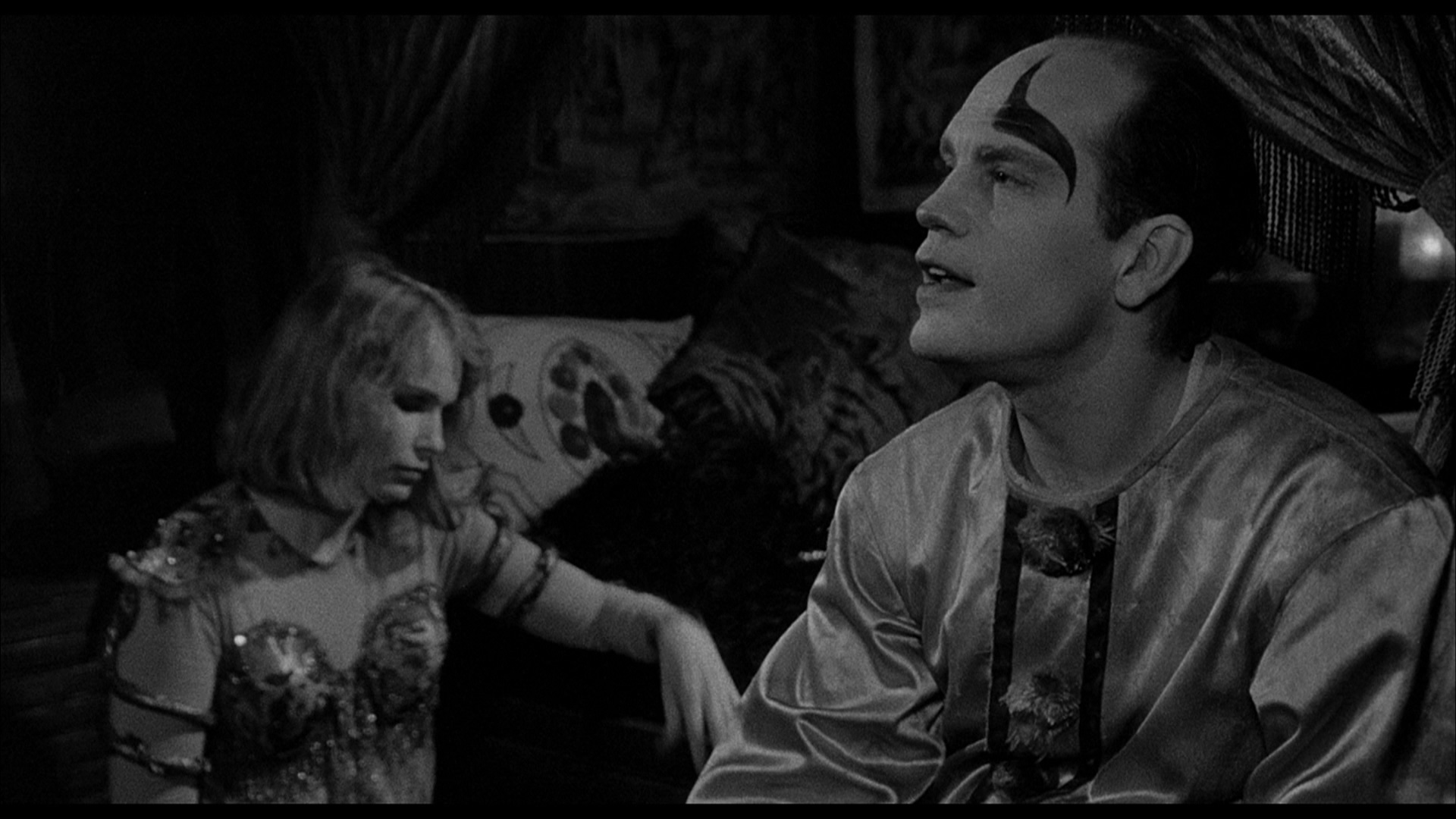
This definitely wouldn't be the best place to start for Allen newcomers, but as a visual experience and an evocation of one of cinema's most astonishing chapters it's quite a remarkable achievement. The star-studded cast (including future Bullets over Broadway star John Cusack, horror icon Donald Pleasence as a surgeon who meets a nasty end, and a wild bordello scene populated by Jodie Foster, Kathy Bates, and Lily Tomlin) was something of an albatross hanging on the film when it opened as moviegoers expected something far more accessible and showy, instead getting a paranoid thriller with funny one-liners and a haunting metaphysical resolution that doesn't play out quite how you think it will. As with several of the prior films, this one first appeared on Blu-ray from Twilight Time (in 2015) with an isolated score track and trailer, then went to Arrow with what appears to be the same video specs (pretty spectacular) and the theatrical trailer.
Reviewed on February 10, 2017.






















